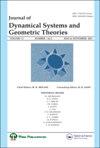Lyapunov Exponents for Quantum Channels: An Entropy Formula and Generic Properties
IF 0.4
Q4 MATHEMATICS
Journal of Dynamical Systems and Geometric Theories
Pub Date : 2019-08-22
DOI:10.1080/1726037X.2021.2014635
引用次数: 4
Abstract
Abstract We denote by Mk the set of k by k matrices with complex entries. We consider quantum channels φL of the form: given a measurable function L: Mk → Mk and a measure µ on Mk we define the linear operator φL : Mk → Mk , by the law ρ → φL (ρ) = ∫ Mk L(v)ρL(v)† dµ(v). In a previous work, the authors show that for a fixed measure µ the Φ-Erg property is generic on the function L (also irreducibility). Here we will show that the purification property is also generic on L for a fixed µ. Given L and µ there are two related stochastic processes: one takes values on the projective space P (ℂ k ) and the other on matrices in Mk . The Φ-Erg property and the purification condition are the nice hypothesis for the discrete time evolution given by the natural transition probability. In this way it will follow that generically on L, if ∫ |L(v)|2 log |L(v)| dµ(v) < ∞, the Lyapunov exponents ∞ > γ 1 ≥ γ 2 ≥ … ≥ γk ≥ −∞ are well defined. In a previous work, the concepts of entropy of a channel and Gibbs channel were presented; and also an example (associated to a stationary Markov chain) in which this definition of entropy (for a quantum channel) matches the Kolmogorov-Shanon definition of entropy. We estimate here the larger Lyapunov exponent for the mentioned example and we show that it is equal to −1/2 h, where h is the entropy of the associated Markov invariant probability.量子通道的Lyapunov指数:一个熵公式和一般性质
我们用Mk表示含有复元素的k × k矩阵的集合。给出一个可测函数L: Mk→Mk和一个测度μ on Mk,根据ρ→φL (ρ) =∫Mk L(v)ρL(v)†dµ(v)的定律,定义了线性算子φL: Mk→Mk。在之前的工作中,作者证明了对于一个固定测度µ,Φ-Erg性质在函数L上是泛型的(也是不可约的)。这里我们将证明,对于固定µ,L上的纯化性质也是一般的。给定L和µ,有两个相关的随机过程:一个取射影空间P (k)上的值,另一个取Mk中的矩阵上的值。Φ-Erg性质和净化条件是由自然跃迁概率给出的离散时间演化的良好假设。由此可以得出,一般在L上,如果∫|L(v)|2 log |L(v)| dµ(v) <∞,则Lyapunov指数∞> γ 1≥γ 2≥…≥γk≥−∞是有定义的。在前人的研究中,提出了通道熵和吉布斯通道熵的概念;还有一个例子(与固定马尔可夫链相关),其中熵的定义(用于量子通道)与柯尔莫戈洛夫-香农熵的定义相匹配。我们在这里估计较大的李雅普诺夫指数对于上面提到的例子,我们表明它等于- 1/2 h,其中h是相关的马尔可夫不变概率的熵。
本文章由计算机程序翻译,如有差异,请以英文原文为准。
求助全文
约1分钟内获得全文
求助全文

 求助内容:
求助内容: 应助结果提醒方式:
应助结果提醒方式:


